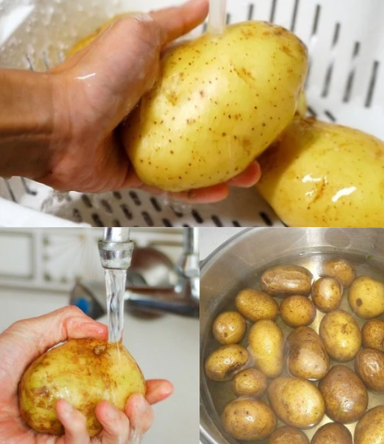
In many homes, meal preparation is more than just cooking — it’s a ritual passed down through generations. But sometimes, those traditions can clash with modern food safety standards. Take, for example, a simple family dinner where potatoes are cooked with their skins unwashed. For some, this might be no big deal, but for others — especially parents serving young children — it can raise serious health concerns. So, is skipping the wash ever safe, or is it a risk not worth taking?
Why Washing Vegetables Matters More Than You Think
Washing vegetables isn’t just about making them look clean; it’s a crucial step in protecting your health. Potatoes, in particular, grow underground and are in direct contact with soil — the perfect hiding place for dirt, bacteria, and chemical residues. While cooking can kill some bacteria, it won’t remove all contaminants. That’s why rinsing and scrubbing is recommended by nutritionists, chefs, and health organizations worldwide. Think of it as your first line of defense before heat takes over.
The Hidden Risks of Eating Unwashed Potatoes
Skipping the wash might seem harmless, but the risks are real. Soil can carry bacteria such as E. coli and Salmonella, both of which can cause serious foodborne illness. Pesticide residues can also linger on the skin, and while regulations limit how much is used, small amounts can accumulate in the body over time. For kids — whose immune systems are still developing — these hazards are even more concerning. Simply put, the dirt you see is only part of the problem; it’s what you can’t see that matters most.
Potato Skins: Packed with Nutrition, If Prepared Safely
Here’s the twist: potato skins are incredibly nutritious. They’re loaded with fiber, potassium, vitamin C, and other essential minerals. Eating them can help regulate digestion, boost immunity, and even support heart health. But to enjoy these benefits without the drawbacks, washing is non-negotiable. A clean potato skin means you get all the good stuff without the hidden dangers lurking in leftover soil or chemical residue.
Video : How to Clean Potatoes
Tradition vs. Food Safety: Finding Common Ground
Cooking methods are often tied to culture and family history. For some, leaving the skins unwashed might be a habit learned from older generations, perhaps in times when food was sourced locally and perceived as “cleaner.” Others may value convenience over caution. The challenge is that what worked decades ago doesn’t always align with today’s food safety standards. Balancing respect for tradition with modern knowledge is key — and it’s possible to do both without offending anyone at the table.
The Right Way to Wash and Prepare Potatoes
Cleaning potatoes is easy, fast, and well worth the effort:
- Rinse them under cold running water to loosen dirt.
- Scrub the skin gently with a vegetable brush to remove any stuck-on soil.
- Optional soak in a mix of water and vinegar for a few minutes to help break down pesticide residues.
- Rinse again before cooking.
Once clean, you can roast, mash, or boil them — skins on or off — knowing they’re safe to eat.
How to Talk About Food Safety Without Causing Tension
Bringing up food safety with family can be tricky. Nobody wants to feel like their cooking is being criticized. The best approach? Be gentle and focus on your concern for everyone’s well-being. You might say, “I know your recipe is amazing, but I’d love to help wash the potatoes — just to be extra safe for the kids.” Offering to take part in the prep keeps the conversation collaborative rather than confrontational.
Video : Always wash your Potatoes 🥔 🧼
Conclusion: Safety and Tradition Can Share the Same Plate
In the end, whether or not to eat unwashed potatoes comes down to personal choice — but it’s a choice best made with all the facts. Washing potatoes doesn’t just remove dirt; it reduces the risk of illness and allows you to enjoy the full nutritional value of the skins. With a little communication and a willingness to adapt, families can honor their cooking traditions while embracing food safety. That way, every meal serves up both flavor and peace of mind.


